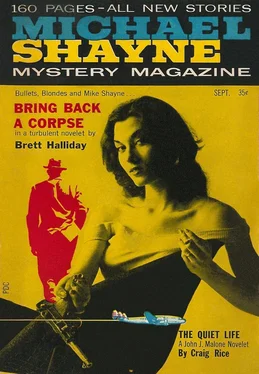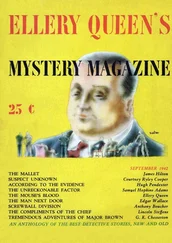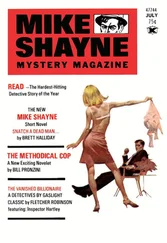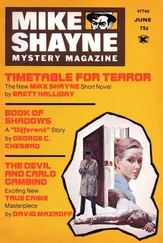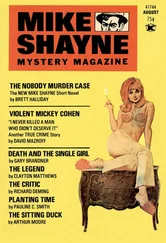Robert Bloch - Michael Shayne Mystery Magazine. Vol. 1, No. 1. September 1956
Здесь есть возможность читать онлайн «Robert Bloch - Michael Shayne Mystery Magazine. Vol. 1, No. 1. September 1956» весь текст электронной книги совершенно бесплатно (целиком полную версию без сокращений). В некоторых случаях можно слушать аудио, скачать через торрент в формате fb2 и присутствует краткое содержание. Город: New York, Год выпуска: 1956, Издательство: Renown Publications, Жанр: Детектив, на английском языке. Описание произведения, (предисловие) а так же отзывы посетителей доступны на портале библиотеки ЛибКат.
- Название:Michael Shayne Mystery Magazine. Vol. 1, No. 1. September 1956
- Автор:
- Издательство:Renown Publications
- Жанр:
- Год:1956
- Город:New York
- ISBN:нет данных
- Рейтинг книги:3 / 5. Голосов: 1
-
Избранное:Добавить в избранное
- Отзывы:
-
Ваша оценка:
- 60
- 1
- 2
- 3
- 4
- 5
Michael Shayne Mystery Magazine. Vol. 1, No. 1. September 1956: краткое содержание, описание и аннотация
Предлагаем к чтению аннотацию, описание, краткое содержание или предисловие (зависит от того, что написал сам автор книги «Michael Shayne Mystery Magazine. Vol. 1, No. 1. September 1956»). Если вы не нашли необходимую информацию о книге — напишите в комментариях, мы постараемся отыскать её.
Michael Shayne Mystery Magazine. Vol. 1, No. 1. September 1956 — читать онлайн бесплатно полную книгу (весь текст) целиком
Ниже представлен текст книги, разбитый по страницам. Система сохранения места последней прочитанной страницы, позволяет с удобством читать онлайн бесплатно книгу «Michael Shayne Mystery Magazine. Vol. 1, No. 1. September 1956», без необходимости каждый раз заново искать на чём Вы остановились. Поставьте закладку, и сможете в любой момент перейти на страницу, на которой закончили чтение.
Интервал:
Закладка:
I took the hint. “It doesn’t matter to me,” I said, and swapped for one of his white radios. That done, I thanked him for the beer and went back to my office.
I had done my job — maybe not with the finesse Nichols wanted, but I had done it. He had offered me fifty to find out what was wrong with Ormes’ pitch — twenty down and thirty when the job was finished. I had thirty bucks still coming.
Nichols walked in, not an hour later. I was smoking a six-cent cigar and winding up another beer when he clipped into the room. He looked as dapper as usual, despite the heat.
He also looked mad. “You sure messed hell out of things,” he said.
My hand was out for the thirty bucks. I pulled it back, empty, and laid it on the desk top. “I found out, didn’t I?”
Nichols snorted. “Found out he used magnets. That’s an ancient gag. Do I pay fifty bucks to learn that?”
“You said, ‘Find out what he’s up to,’ ” I reminded him.
“Find out — yes,” he squawked. “And why. Would he cause a riot to save a ten-buck radio?”
“You want a lot for your fifty,” I said.
He rocked back and forth on his toes. “If you can’t do it, I’ll get someone who can.”
That thirty bucks due me looked very, very big. The twenty I had would help for a while, but I need to eat. I also needed a little rep as a good detective. Starting a riot wasn’t doing it. Not with Grimsby.
“All right,” I said.
Nichols marched out. I leaned back, wearily, to check over what I knew and try to fit it into a sensible answer. Why would a punk like Ormes raise such hell over a lousy little radio?
I took the radio I had won and gave it a good going over. There was nothing inside but cheap tubes and wiring. I plugged it into the wall and it played — not good, but it played.
At dark, I went out to eat. I came back, thinking so hard about it that I was inside the office door before I realized anything was wrong. I remembered the odd way Ormes had acted over the radios, but it didn’t make much sense, no matter how I twisted it in my mind.
What I stepped into did make sense. The office was dark, but I wasn’t alone in it. I had one hand reaching for the light switch when I heard the footfall, a light, near-inaudible sound.
I dropped my hand away from the wall and went for my gun. Something hard rammed into my belly, driving me backward. I clawed and got nothing. I rolled over as I hit the floor and came up swinging. For the second time that day, someone conked me. This time it was a good job. I sensed it coming, but couldn’t duck fast enough. Lightning exploded in my brain. I went down and out.
I came to, feeling like the wrong end of a six-day drunk. I was still in the office. Carefully, I got to my feet and wobbled to the door. I turned the light on this time and made it to the wash-stand. Cold water helped a little, and I staggered to my desk. A shot of whiskey from the bottle in my drawer helped a little more. After a while, I could look around and see what had happened.
It was senseless for anyone to knock over my office. There had never been anything in it. I made a quick check. My few files were still intact. My desk hadn’t been disturbed. Everything was the same. Then I got it...
The radio was missing!
I remembered what Nichols had said — that Ormes wouldn’t have started a riot over a ten-buck radio. But Ormes had — and he had carried it one step farther. My aching head was proof of that.
Still, I was no further along than I had been. The big why was still unanswered.
At ten o’clock, I was still sitting there, still as far as ever from an answer. The agony in my head was subsiding, however, and the rattle of the doorknob only made me groan. I got up and answered it.
Grimsby came in, looking sore as hell, “I hear you saw this farmer, Teel.”
“He bought me a beer.”
“Was he drunk?”
I said, “No. He wasn’t that kind. He wanted to get home to his Martha with the radios.” Grimsby’s pulled-down mouth worried me more than usual. “What’s wrong?”
“Teel didn’t get home,” he said. “He killed himself halfway there.”
That was like getting a third conk on the head. I stared at Grimsby, my mouth hanging open. He fed the details to me in capsule form. Teel had got his pickup truck and headed over the hills for home. Halfway there he had to drive down a graveled hill and cross a wooden bridge. He had evidently lost control of the truck and hit the bridge railing. The car had crashed through, dropping thirty feet into a pothole in the river. Teel had drowned.
Grimsby concluded, “That guy drives that road week after week, snow or rain or what have you. It don’t make sense.”
But it was beginning to make sense — at least for me. For the first time, I was getting some ideas. They began to come quick and fast. I almost said something aloud, and then I realized Grimsby hadn’t come up here just to tell me about Teel.
Instead of blurting out everything, I said, “Why come to me?”
“You,” Grimsby said, “started the riot.”
“I told you about that.”
He ignored me. “Some of the farm boys told me how you waltzed in and won the first radio. Were you shilling for Ormes, maybe?”
“Hell, no! I just wanted a radio.”
Grimsby grunted. I knew what was biting him. He didn’t like me to begin with, so he was hoping to connect me with this trouble some way. He came right out and said it. “I got ideas,” he told me. “If I find you’re hooked up in this, Parker, you’re through around here.”
He turned and strode out, still sore. I listened to his footsteps recede, then I grabbed my phone. I was connected with the “trouble,” all right — more than I liked, perhaps. But if what I thought was the truth, I wasn’t going to let Grimsby, or anyone else, scare me away. I was getting good and sore myself.
I called the head office and gave them instructions, telling them to wire the answer. If this was a cold lead, they’d take the expenses out of my hide, I knew that. But it had to be done. I hung up. Then I got my hat and set it gingerly on my aching head. There were still a few things I wanted to know.
I walked carefully, to make sure Grimsby didn’t have a tail on me. As far as I could tell, I was clear when I got to the carny grounds. The show was still going strong. I found Nichols in his railway-car office and went in. He looked worried and unhappy.
“Did you hear?” he asked me.
“I heard,” I said. I sat down and studied him. “You’ve pussyfooted long enough. I want to know just why you had me put the bite on Ormes.” I was sore.
Nichols got up nervously and checked to see that his shades were drawn. When he sat down, he was sweating and not quite so dapper. “Trouble,” he muttered. “Nothing but trouble! In every town, it’s some little thing. But this is the worst. We’re jinxed, Parker. This winds it up — a suicide.”
I let that last item pass. “Give me a list of these troubles,” I said.
Nichols was vague. Troubles, to a carny man, are nine-tenths superstition. He could read an in-grown toenail as a bad omen. But I got enough to know he was scared of his own shadow — enough to give me a lead.
I said, “I can clear it up for you, but it’ll cost another zero on that fifty you hired me for.” He squawked, but I hung on. “I’m sticking my professional and personal neck out,” I told him. “Take it or leave it.”
He took it — and paid half in advance. I went out fast after that. Getting in my car, I headed out the county highway. In about two miles, it turned from concrete to gravel. Three more miles, and I came to the top of the long hill. Here I stopped. It was all silent below, though, so I drove on.
Читать дальшеИнтервал:
Закладка:
Похожие книги на «Michael Shayne Mystery Magazine. Vol. 1, No. 1. September 1956»
Представляем Вашему вниманию похожие книги на «Michael Shayne Mystery Magazine. Vol. 1, No. 1. September 1956» списком для выбора. Мы отобрали схожую по названию и смыслу литературу в надежде предоставить читателям больше вариантов отыскать новые, интересные, ещё непрочитанные произведения.
Обсуждение, отзывы о книге «Michael Shayne Mystery Magazine. Vol. 1, No. 1. September 1956» и просто собственные мнения читателей. Оставьте ваши комментарии, напишите, что Вы думаете о произведении, его смысле или главных героях. Укажите что конкретно понравилось, а что нет, и почему Вы так считаете.
